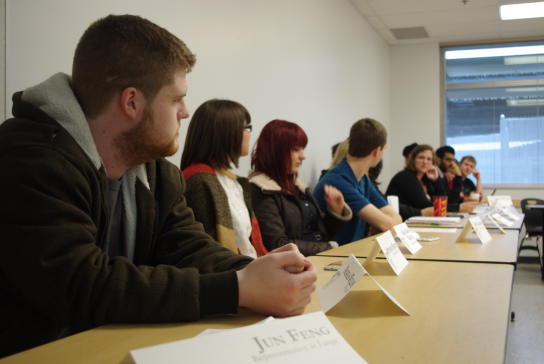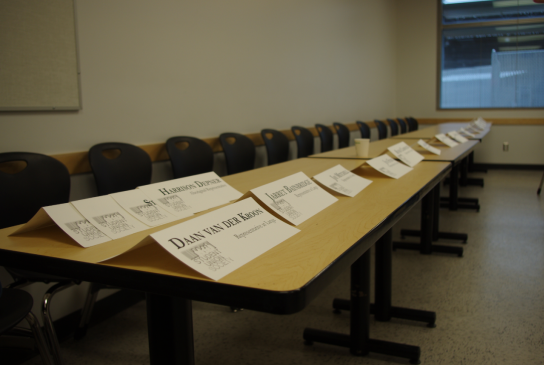Print Edition: March 6, 2013
CASA membership, budget reform and improving the relationship between the student union and other campus groups were the top items of discussion at last Thursday’s first SUS board of directors all-candidates meeting, held in Abbotsford.
Attendance was sparse, but that didn’t stop candidates from engaging in a spirited debate about issues relevant to UFV’s student body.
Each of the student candidates present offered a brief opening statement about their qualifications and goals for their term. This year’s field of candidates is top-heavy, with 10 students vying for six executive positions and only 11 candidates running for 10 available representative positions.
There are no candidates running for accessibilities representative, Chilliwack representative or international representative for the 2013/2014 year.
Spotty meeting attendance from hopeful candidates
Only 13 of 21 candidates were present for the entirety of the meeting. Debbie Ellis and Jarret Bainsbridge were unable to make the meeting due to other commitments, but sent statements to be read out loud in their absence. Rep-at-large candidate Jay Mitchell and aboriginal rep candidate Harrison Depnar made brief appearances due to class commitments.
Notably absent were VP social candidate Zack Soderstrom, VP academic candidate Zera Gregoire and SUS veterans Dan van der Kroon and Jun Feng, who are both running for rep-at-large positions.
A three-way race for president
Incumbent president Shane Potter is squaring off against current VP social Chris Doyle and ex-accessibilities rep Mehtab Singh Rai for the top job. In their opening statements, the three presidential hopefuls outlined the important points of their respective platforms.
Doyle, who spoke first, described his four goals: to create a better relationship between the SUS and the university, to increase student involvement, to progress construction of Student Union Building and to protect the operations of the student pub.
“We need to get [students] involved every step of the way,” he said, “so we don’t have issues like we did this year where students are unaware of issues that come up, such as AfterMath.”
The campus lounge has been under heavy scrutiny after years of exceeded budgets and mismanagement, and was allotted emergency funds last November to keep the sinking campus pub afloat until the end of the fiscal year.
Doyle insisted that the campus institution is a valuable service for students and the UFV community.
“I want to be fair to AfterMath,” he concluded. “That’s where we have a lot of our employees, a lot of our staff. I think we have to acknowledge that fact and respect that.”
Potter, who was elected as VP east in 2012 and became interim president last fall, said that the society has not grown with the university.
“The Student Union Society has become stagnant,” he said. “What we need is a representative government of community leaders.”
In order to address these issues, Potter says he’s planning a budget reform that will allow for student input much earlier in the process and a restructuring of the student union board of directors to include clubs and associations representatives in the voting process.
“All I’m asking is for is the student body is to allow me to continue,” he said. “I will create change, I will make the Student Union Society a better place and I will bring the student union society back to the students.”
Mehtab Signh Rai was elected as accessibilities representative in last year’s fall by-election, but gave up the position to serve as the Cascade Journalism Society’s president. He put board member accountability, SUS-student body relations, board reform and government advocacy at the top of his agenda.
“What I’d like to do is guarantee is that any candidate carries out the duties as described in the SUS governing manual,” he said. “I would ensure that we lobby our provincial government to eliminate the interest students incur on their BC student loans and to increase the core funding to our institution.”
Rai is a philosophy major and has also previously held the SUS position of interim VP social.
Vice-presidential candidates focus on reform, accountability and student engagement
Incumbent VP finance Ryan Petersen is running unchallenged, and cited his long history with the student society and recent work in as reasons for his election bid. His plans for the next year include continued work with the university’s finance department.
Petersen’s closing slogan received the strongest applause from the gallery mostly made up of other candidates.
“A vote for me is a vote for beards, bow ties and fiscal responsibility,” he said.
SUS newcomer Kristianne Hendricks described her experience with Oxfam and UFV’s Students for Sustainability as important to her decision to run for VP academic. She said that she would reach out to students by setting up a regular meet and greet booth outside Tim Hortons.
Returning VP internal candidate Greg Stickland, whose main responsibilities would include board governance, leapt from behind his seat to offer an abbreviated PowerPoint presentation outlining his plans for board reform to better membership accountability.
Stickland said that many students get confused when attempting to get in touch with their student union because of confusing accountability practices. He pointed to a diagram of the board’s current reporting structure in which most other VPs report to VP internal and exclaimed, “Not efficient!”
His reform proposal featured a return to a more hierarchic system which he says would allow for greater director accountability. There would be one president, a second level of two or three vice-presidents, a third level of officers, and a fourth level of reps and volunteers.
VP social candidate Nick Willms said his goals for the semester include unity between Chilliwack and Abbotsford campuses, a higher sense of SUS awareness among student body and better weeks of welcome events. In his closing statement, he promised to bring students “puppies and fireworks.”
Willms provided no details about this plan.
In a submitted statement Debbie Ellis, the single VP east candidate, apologized for not being able to make the meeting and said that her number one reason for running for VP east is to address students’ daily concerns.
The position of VP east will take on added significance this term as there are no candidates running for Chilliwack representative.
Addressing the CASA membership conundrum
SUS membership in the Canadian Alliance of Student Associations (CASA) was downgraded to an associate membership last year to allow the society a cheaper membership fee for one year before making a decision to either return to full-membership or drop out together.
CASA is a national lobbying group that brings student interests to the federal government, mainly through arranging meetings with government representatives on behalf of Canadian students. The membership fee isn’t cheap, and the candidates are divided as to whether SUS should remain a member.
Most of the representatives said that they would need to do more research before deciding on a position, or that the vote should go to student referendum with a dedicated fee attached in order for continued membership.
Doyle and Willms both said that the SUS is not yet ready to be a full member, instead stating that SUS should focus on local lobbying efforts.
“We need to focus on local and provincial lobbying before we can extend that far,” Doyle said.
Potter said that his position on CASA has “swayed” since he joined the board, from a completely opposed stance to seeing the benefit in membership. He said that a mandate would have to come directly from the students via referendum.
VP internal candidate Greg Stickland said he feels that CASA is more effective than its counterpart, the Canadian Federation of Students (CFS) because it focuses on meetings and practical work rather than large-scale protest.
“It’s much less sexy, but it’s more effective,” he said.
Stickland expressed some uncertainty over membership due to financial concerns.
Presidential candidate Rai was the only presidential candidate to take a strong stance on remaining a member of CASA.
“I think we’re ready for it,” he said. “I think we should engage it.”
VP academic candidate Hendricks, whose primary responsibility would be advocacy efforts including CASA-related activity, also deferred to a possible student referendum.
When pushed to give a definitive personal take on the membership question after the debate, Hendricks said she needed to do more research.
“At this point in time, I don’t know enough about CASA to be able to say that I could give the right vote for UFV today,” she said. “What I want to do is first learn everything I need to know and bring that to the students. I think it’s very good to have an overarching governing body that is lobbying with us so we have a stronger voice, but whether CASA is that voice, I don’t know yet.”
Representative candidates speak about qualifications and proposed projects
Aboriginal representative candidate Harrison Depner made a brief appearance to provide his opening statement. He said he plans on using his skills and knowledge gained in the position in the last half term to continue to represent the interests of aboriginal students in the student union.
His opponent Ashley Camille criticized the disconnect between Abbotsford and Chilliwack students. She said her goal is to not only connect aboriginal students, but connect them to SUS.
Natalia Deros, candidate for clubs and associations rep, said she wants to raise the profile of campus groups through advertising, a better flow of information about campus events to campus media and a redesign of the clubs and associations page to include regularly updated information. She also said that semesterly registration requirements for clubs and associations make it difficult for these groups to continue to operate in an official capacity.
“I suspect that many campus clubs are technically defunct because they forget to apply,” Deros said. “I think that Oxfam UFV is technically defunct because of this.”
She also said that she would work to ensure a smooth transition of these groups from the jurisdiction of Student Life to the jurisdiction of SUS.
The field of representative-at-large candidates introduced many newcomers to the SUS board, including Renee Czarnecki, Thomas Davies, Stephanie Martin and Sarah Gabor-Martinez.
Davies’ involvement in the external budget committee piqued his interest in the SUS board of directors. He said his work with two non-profit organizations in Chilliwack has provided him with valuable procedural and organizational management skills that he would bring to the position of representative-at-large. Fiscal responsibility and addressing the concerns non-Abbotsford and Chilliwack residents have with the U-Pass is another one of Davies’ main goals as rep-at-large.
Gabor-Martinez said her pet project as representative-at-large would be making UFV the country’s fourth fair trade campus.
“Honestly,” she said, “it’s an awesome thing.”
Two candidates are getting involved on campus earlier than most. Czarnecki is in the second semester of study at UFV while Martin is in her first. Czarnecki cited her work in helping start a club as motivation to join SUS, and Martin noted her work in a non-profit organization in Chilliwack.
Fellow representative-at-large candidate Jarret Bainsbridge, in a statement submitted in his absence, pointed to his leadership in the Movember UFV Facebook page, which helped raise $547 for prostate cancer research.
The Chilliwack all-candidates meeting will be held on Thursday, March 7 from 11:00 a.m. to 12:30 p.m. in room A2416 of the CEP campus. All students are welcome to attend and are encouraged to ask the candidates any questions they may have.
Polling runs from March 11 to 17. New directors will take their positions on April 1.




